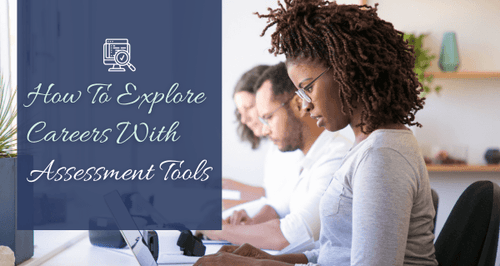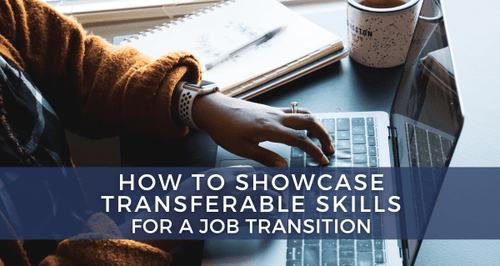
How To Get The Job Even If You Don't Have Experience
Starting a new career is daunting when you don’t have the required or desired experience listed on the job postings you find.
College graduates and major career changers alike struggle with imposter syndrome.
- “How can I do the job well if I’m so new to it?”
- “I get that it’s an entry-level job, but why would an employer consider me when I know other applicants have the experience?”
- “Where should I even start if I have nothing to bring to the table?”
Stop right there. What you bring to the table has very little to do with your qualifications and skills.
Recruiters have addressed before that, in most cases, the job posting is a wishlist; and candidates with at least 60% of the qualifications and skills will still be considered. In other words, getting the job when you don’t have experience is more about how you’re applying than what you’re applying with.

This blog contains affiliate links, meaning I may receive a small commission (at no cost to you) if you subscribe or buy something through the links I share. I only share links to products or services that I use myself or absolutely love!
1 | Narrow Down Your Job Target
A little research will show you that there is a wide range of responsibilities varying by job title and industry for a given job target. For example, a Sales Coordinator will have a different role, level of stress, and work style than a Sales Representative. These details will relate directly to the specific goals of that role.
Even if you know what career you want to transition into, narrow down your job target so you can speak specifically to the unique goals of the role you’re targeting in your resume, LinkedIn profile, networking events, and job interviews.
2 | Get Clear On Your Drive & Value
When you don’t have experience that relates to the specific job you’re applying for, you’ll need to draw attention to what differentiates you from a more qualified candidate. Consider what is driving you to pursue this job target; your answer should be job-related, not personal (“The pay increase” or “Spending more time with my family” aren’t the answers employers want to see.
Your drive along with the unique value you offer, or the results that you can produce for this employer based on your skills or past experiences, will give you an edge over competition that may only be relying on their past job titles to land the job.
3 | Focus On Your Transferable Skills
Another area to draw more attention to in your resume, LinkedIn profile, and interviews is your transferable skills. These are skills learned from the experience that you do have and can be used to connect the dots between the experience you have and the career you’re targeting now.
Transferable skills include communication, presentation, listening, problem-solving, troubleshooting, research, time management, organization, planning, leadership, conflict resolution, collaboration, customer service, and creativity. These are skills you can’t just list and expect them to make an impact. These are skills that you need to have solid examples of how you demonstrated the skill and what resulted from your efforts.
4 | Avoid Online Job Applications
Don’t fall into the trap of “application convenience” and restrict your job search to online job postings and job boards. Online job applications (whether they ask you to upload a resume or not) are designed to eliminate candidates based on answers to specific questions or keywords.
If you don’t have experience, online job applications will only cause frustration and be a waste of time. The more effective approach is to bypass these software programs by making connections within the companies you’d love to work for.
5 | Network With Others In This Field
Networking is the key to getting a job when you don’t have the experience that the employer is looking for. You can start by joining professional associations and attending local events or using LinkedIn to reach out to others in your field. The trick with networking is to find ways to be a giver and not just a taker.
Successful networking requires you to establish and maintain a mutually beneficial relationship. Jumping straight into, “I’m looking for a job and was hoping you could tell me how to get hired at your company,” just won’t work. Start by asking about his or her job, what they like the most about the company they work for, and what projects he or she has been working on before asking what advice they would be willing to offer someone in your shoes.
6 | Consider Job Shadowing or Internships
Job shadowing and internships are great ways to gain relevant experience while making contacts within the companies. You’ll get an inside look at a typical day, week, or longer in that role as well. You may change your mind about certain aspects of your job search such as which job titles you actually want to target in your job search.
If you can’t commit to an unpaid or low-paying internship (I get it, there are bills to pay!), asking others in your field if you can job shadow them for a day or two can be incredibly beneficial. The person you ask to job shadow may have to get approval from a manager, so remember to take the job shadowing seriously.
7 | Follow-up Appropriately
More often than not, you’re not following up appropriately after applying for a job or forming a new networking relationship. If you apply online knowing that you don’t have experience, you must follow up within a few days to check in on your application and then again the following week to a specific contact that you’ve made within the company. This is how you show genuine interest in the job.
The most common networking mistake is to establish a new professional relationship and then to let it fade away. Checking in on your new connection once a week isn’t challenging but coming up with genuine ice-breakers can be. Stop trying so hard, and take a genuine interest in his or her personal and professional life.
Not sure how or when? This step-by-step Follow-up Plan includes a digital planner and templates to help you track and follow up consistently on job applications, networking efforts, and interviews
8 | Interview Well
Interviewing is difficult when you don’t have the experience required or desired for the position. The good news is getting the interview means the employer is more interested in your train-ability and how well you’ll fit with the company’s culture. Instead of talking up the experience you don’t have, focus on the future and how you plan to contribute toward organizational goals.
Do some research ahead of time. Research can also include asking your contacts within the company on LinkedIn about their outlook on company problems, plans, and visions for the future. Asking about the work environment and company's values can also help you align your conversation during the interview. These are valuable insights that can help you stand out and get the job even if you don’t have experience.
Related Articles
-

Navigating Your Career Path with a Family Nurse Practitioner Degree Program
Guest blogger Sadie Smith reveals how strategic planning in your healthcare career broadens your impact on patient care and community health.
-

Career Transitions: Navigating Your Path to Success in Healthcare and Beyond
Guest blogger Sadie Smith shares how to leverage your existing skills and experience while pursuing new career opportunities in healthcare and other industries.
-

The Best Resume Tips for Recent Law School Graduates
Guest contributor Luke Bell shares practical resume tips to help recent law school graduates make a lasting impression on potential employers.
-

How To Explore Careers With Assessment Tools
Career assessments are emerging as practical tools that provide a systematic framework for professionals undergoing career transitions.
-

How To Showcase Transferable Skills And Your Value For A Career Transition
Recognizing the significance of transferable skills is key to successfully showcasing one's potential in the face of change.








